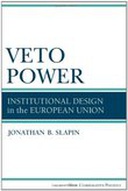Explore

Jonathan B. Slapin traces the historical development of the veto privilege in the EU and how a veto -or veto threat- has been employed in treaty negotiations of the past two decades. As he explains, the importance of veto power in treaty negotiations is one of the features that distinguishes the EU from other international organizations in which exit and expulsion threats play a greater role. At the same time, the prominence of veto power means that bargaining in the EU looks more like bargaining in a federal system. Slapin's findings have significant ramifications for the study of international negotiations, the design of international organizations, and European integration.
This book is included in DOAB.
Why read this book? Have your say.
You must be logged in to comment.
Rights Information
This work has been claimed by University of Michigan Press.
Downloads
This work has been downloaded 281 times via unglue.it ebook links.
- 93 - pdf (CC BY-NC-ND) at OAPEN Library.
- 134 - pdf (CC BY-NC-ND) at Unglue.it.
Keywords
- Amsterdam
- European integration
- European Union
- France
- Germany
- Intergovernmentalism
- KUnlatched
- Legislative veto
- Member state of the European Union
- Political Science
- Political Science / International Relations
- Politics and government
- Status quo
- Veto
Links
DOI: 10.3998/mpub.2012704Editions

